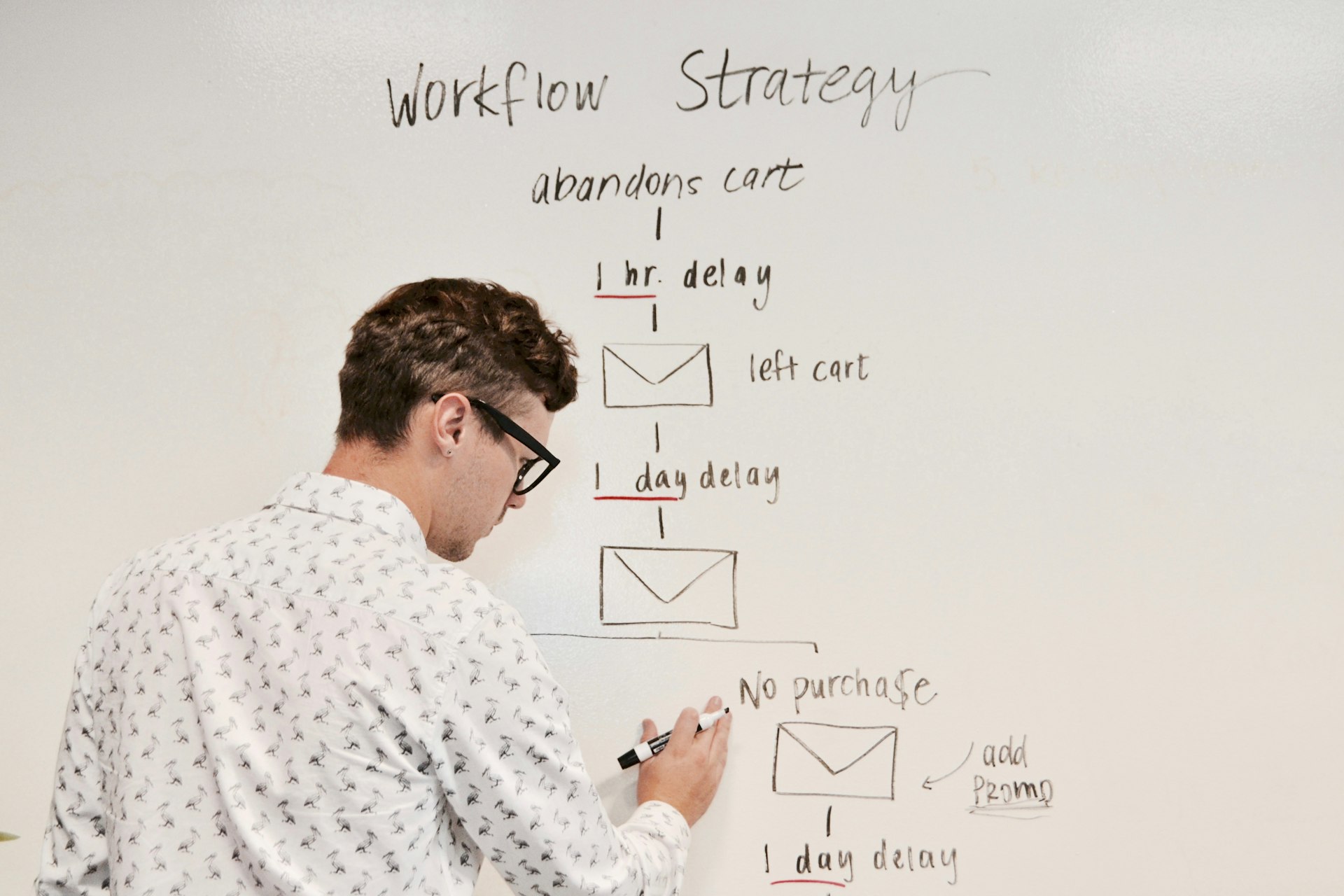Unlocking Growth: How Marketing Automation Transforms Lead Nurturing Funnels

Photo by Wilhelm Gunkel on Unsplash
Introduction: The Power of Automation in Lead Nurturing
In today’s competitive digital landscape, businesses face the ongoing challenge of efficiently moving leads through their sales funnel.
Marketing automation
has emerged as a critical solution, helping companies nurture prospects, maintain engagement, and ultimately convert more leads into loyal customers. By automating key touchpoints and communications, organizations can deliver more personalized experiences at scale, save time, and optimize their resources for maximum impact.
[1]
Understanding Lead Nurturing Funnels
A lead nurturing funnel is a structured set of stages that guides potential customers from initial awareness to a final purchasing decision. The process typically includes:
- Attracting new leads through content, ads, or social media
- Capturing contact information via forms or sign-ups
- Providing valuable, relevant information to educate and engage prospects
- Building trust and a relationship over time
- Prompting decision-making actions, such as demos or purchases
Effective lead nurturing requires consistent, timely, and relevant communication-something that can be difficult to achieve manually at scale. This is where automation excels.
Key Benefits of Marketing Automation in Lead Nurturing
Businesses that implement marketing automation in their lead nurturing funnels can experience several significant advantages:
-
Improved Efficiency:
Automation tools handle repetitive tasks like sending emails, segmenting leads, and scoring prospects based on behavior.
[2]
- Personalization at Scale: Automated systems can deliver tailored messages based on each lead’s interests, actions, and stage in the funnel.
-
Higher Conversion Rates:
Timely, relevant follow-ups keep leads engaged and more likely to convert.
[5]
- Data-Driven Insights: Automation platforms track engagement metrics, helping teams refine strategies and improve outcomes.
Real-World Examples of Automation in Action
Marketing automation can be used across the funnel to address various scenarios. Here are several proven applications:
1. Automated Welcome Campaigns
When someone subscribes to a newsletter or creates an account, a welcome email sequence can be triggered automatically. For example, brands like Kate Spade send concise, friendly welcome emails that include helpful information and clear calls-to-action, such as exploring products or enjoying an exclusive offer.
[4]
How to implement: Set up an email automation workflow in your platform (e.g., HubSpot, Mailchimp) to send a series of emails that introduce your brand, set expectations, and guide new contacts to their next step.
2. Abandoned Cart Reminders
For ecommerce businesses, cart abandonment is a major hurdle. Automation allows you to send reminder emails to visitors who leave items in their cart, often including incentives like discounts or free shipping to encourage completion of the purchase.
[1]
How to implement: Integrate your ecommerce platform with your marketing automation tool to trigger emails when a cart is left behind. Customize messages based on cart contents and user behavior.
3. Lead Segmentation and Targeted Nurture
Automated segmentation sorts leads into groups based on interests, actions, or demographics. For instance, clicking different links in an email could place users into distinct interest-based segments, allowing for more precise follow-up.
[2]
How to implement: Use your CRM’s tagging or segmentation features to automatically update lead records based on their interactions. Deliver customized content to each segment to maximize relevance.
Step-by-Step Guide to Implementing Marketing Automation in Lead Nurturing Funnels
Taking your lead nurturing to the next level with automation involves several key steps:
Step 1: Define Your Funnel Stages
Map out the journey your leads take, from first touch to final sale. Common stages include Awareness, Interest, Consideration, and Decision. Clearly define the criteria for moving leads from one stage to the next.
Step 2: Choose the Right Automation Platform
Select a marketing automation tool that fits your business size and goals. Popular platforms like HubSpot, Salesforce Marketing Cloud, and Mailchimp offer robust lead nurturing features. Many provide pre-built templates and workflows to simplify setup.
[3]
Before committing, review each platform’s features, integration options, and pricing. Most providers offer free trials or demos to help you evaluate their fit.
Step 3: Create Engaging Content for Each Funnel Stage
Develop email templates, educational resources, and promotional offers tailored to the needs of leads at every stage. Welcome emails, product guides, case studies, and exclusive discounts are all valuable touchpoints.
Ensure your content is concise, clear, and actionable. Use personalization tokens to insert recipient names, company details, or relevant products.
Step 4: Set Up Automated Workflows
Design automation sequences that trigger specific actions based on lead behavior. For example:
- Send a welcome sequence after signup
- Deliver reminder emails for incomplete purchases
- Offer targeted content based on prior engagement
Test each workflow to confirm triggers and outcomes are functioning correctly. Most platforms allow you to preview and simulate automation before launch.
Step 5: Monitor, Analyze, and Optimize
Use your automation platform’s analytics tools to track open rates, click-throughs, conversions, and other key metrics. Regularly review performance data to identify what’s working and where improvements can be made.
[5]
Experiment with A/B testing on subject lines, messages, or offers to continually refine your approach. Consider feedback from your sales team and actual customers to adjust strategies over time.
Overcoming Common Challenges in Marketing Automation
While automation offers powerful benefits, businesses may encounter obstacles such as:
- Complex Setup: Configure workflows carefully to avoid errors or missed communications. Start with basic sequences before adding complexity.
- Content Fatigue: Over-automation can lead to unsubscribes if messaging is too frequent or irrelevant. Adjust pacing and always provide value.
- Data Quality: Automation is only as effective as your data. Regularly clean and update your lead lists for accuracy.
Solutions include ongoing training for your team, regular audits of your automation logic, and staying up to date with best practices from platform providers and industry resources.
Alternative and Complementary Approaches
Automation works best when combined with human touchpoints and multi-channel engagement. Consider supplementing automated emails with:
- Personal calls or messages from sales representatives for high-value leads
- Targeted social media interactions
- SMS reminders for timely promotions
Multiple touchpoints across channels reinforce your message and increase the likelihood of conversion.
[3]
How to Access Marketing Automation Tools and Services
To implement marketing automation in your lead nurturing funnel, you can:
- Research leading platforms such as HubSpot, Salesforce Marketing Cloud, Mailchimp, or Marketo. Visit each company’s official website to review features, pricing, and customer reviews.
- If you need guidance, contact the sales or support teams of these providers-contact details are typically available on their official sites.
- Request demos or free trials to explore functionality and decide which solution best fits your needs.
- Search for local digital marketing agencies with expertise in automation implementation if you prefer professional assistance.
When evaluating options, consider scalability, integration with your current systems (such as CRM and ecommerce platforms), and the quality of customer support offered.
Conclusion: Transform Your Lead Funnel with Automation
Automating your lead nurturing funnel can revolutionize your sales process, delivering personalized experiences at scale while freeing your team to focus on high-value activities. By following structured implementation steps, leveraging real-world examples, and staying adaptable in your strategy, you position your business for sustainable growth in a rapidly evolving marketplace.

Photo by Istvan Hernek on Unsplash
References
- The Pulse Spot (2022). 6 Examples of How to Use Marketing Funnel Automation to Nurture Leads.
- Zapier (2024). 8 Essential Marketing Automation Examples.
- ManoByte (2023). A Step-By-Step Guide to Lead Nurture Strategies.
- Encharge (2025). 11 Lead Nurturing Campaign Examples for 2025.
- Salesforce (2025). What is Lead Nurturing? Examples, Strategies, & Tips.
MORE FROM todayhiring.us













